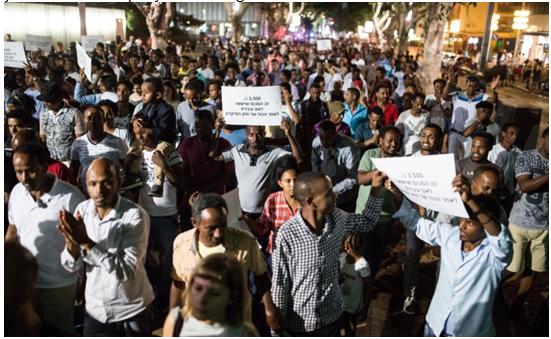For years, African refugees and asylum seekers in Israel have been detained, threatened with deportation, and continually facing hostility from the far-right government. Since last year, they must contend with yet another burden: a de facto 20% salary cut that has driven them further into poverty.
Israel’s roughly 35,000 African refugees and several Israeli groups that support them say the law passed last year — requiring that 20% of their monthly salary be withheld by their employers and deposited in a special account but is only given to them if and when they leave the country — is yet another attempt by the racist government to force them out.

African migrants and supporters demonstrate against the “Deposit Law” in Tel Aviv. (Photo: Activestills)
The Africans, mainly from war-torn Sudan and dictatorial Eritrea, began arriving in Israel in 2005 through its porous border with Egypt after Egyptian forces violently supressed a refugee demonstration and word spread of safety and job opportunities in Israel. Tens of thousands crossed the desert border, often after enduring dangerous journeys, before Israel completed a barrier in 2012 that stopped the influx.
Israel’s government does not hide its intentions behind the “deposit law” which, according to the Interior Ministry, is meant to make Israel a less attractive option for migrants. Again, the law requires migrants’ employers to hand 20% of their salaries to the state, which says it keeps the money until the migrants leave, at which point they can reclaim the cash.
Unlike a tax, the withholding does not grant the migrants any additional social services, to which their access is already limited. Employers are also tasked with deducting an additional 16% of African workers’ salaries toward a “pension fund,” but this social benefit is inaccessible until asylum seekers choose to leave Israel.
Employers who hire refugees must also pay an additional tax, implemented to encourage employment of Israeli citizens over foreigners, which makes finding work an even greater challenge for migrants.
In May, the Population Immigration and Border Authority told a meeting of the Knesset Interior Committee that in many cases employers deduct the 20% “deposit” from wages, but only transfer part of it to the special account, Haaretz reported. According to an April report from The Marker, many employers simply keep the cash for themselves, which blunts the purpose of the law in providing an incentive for the migrants to exit the country because little or no money is being put aside for when they leave.
ASSAF, an Israeli aid group for migrants, has tracked the law’s effects since it was enacted. It said that requests to the group for food assistance by migrants have increased by a third over the past year. Inquiries regarding job loss increased by more than half and there was a more than 80% increase in migrants registering concern over homelessness. “They used to be poor before as well. Now they are poorer,” said Sigal Rozen, public policy director of the Israeli aid organization Hotline for Refugees and Migrants.
According to Zoe Gutzeit, director of the Migrants and Refugees Department at Physicians for Human Rights, the African refugees in Israel are denied basic human and social rights. “The ‘deposit law’ is yet another cruel and well-planned step that attempts to harass and abuse asylum seekers, and make their lives miserable so that they will leave Israel ‘voluntarily.’ For asylum seekers who suffer from health problems, this amendment is particularly severe. Asylum seekers are not included under Israel’s National Health Insurance Act and have very limited access to public health care services. Asylum seekers who are employed may receive coverage from private health insurance companies, but this coverage is extremely limited and terminates once the person becomes too ill to work. It is often the case that asylum seekers rely on non-profit institutions to receive primary health care services. Those who are prohibited from access to public health services and have no way of receiving treatment elsewhere remain, to this day, in pain and suffering and without proper medical treatment, and susceptible to dangerous deterioration of their health. Those who, until recently, have succeeded with great difficulty to finance treatments such as medications and necessary tests now experience a one-fifth reduction to their wages. This reduction directly affects their living conditions including food security and their ability to continue supporting themselves and their families.”


